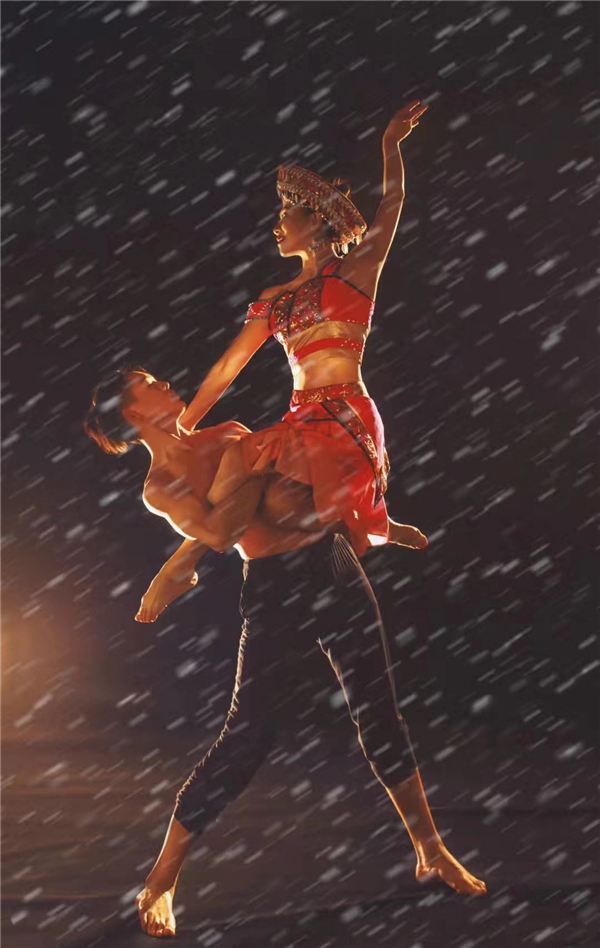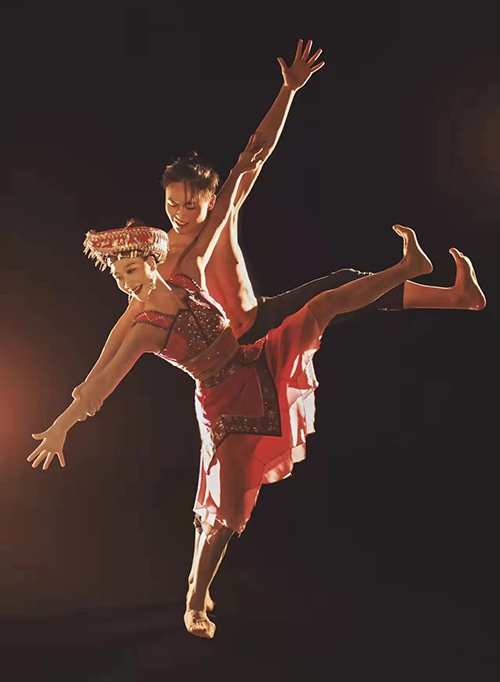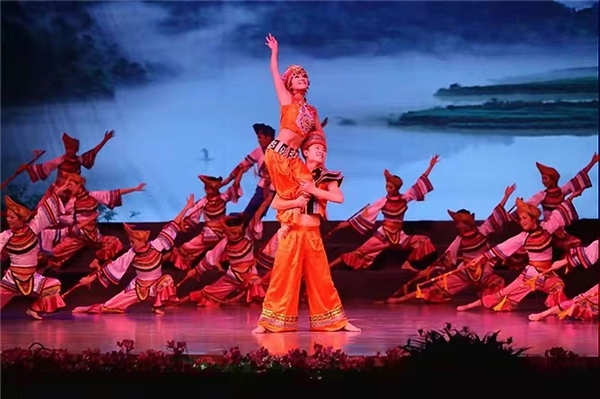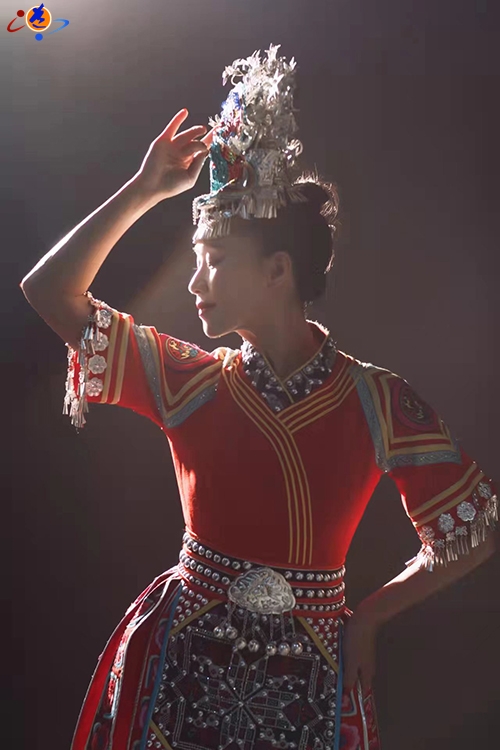Life dances to the extreme, and there is a love word between men and women.
People in the world often give Xia Bing the labels of Hubei, ethnic minorities, green dance, red dance and so on. But in fact, if you deeply perceive Xia Bing’s life state and her works, you will find that no amount of labels can be generalized. Xia Bing is always a fresh person, she is constantly jointing, growing, changing… every time When you set an image for her, her next move will instantly shatter all your imaginations.
▲Dancer Xia Bing
Someone mentioned that Xia Bing rarely paints love dances. Xia Bing listened to her heart and thought about her favorite love look. There are thousands of gestures in love. Before falling in love, each is itself, looking for it, waiting to meet; love to the depths, read to the depths, the reality is you, the dream is you, like the breeze blowing across the earth, gentle and comfortable, like The sun and the moon alternate, ignoring the day and night; holding the hand of the child, holding it for a long time, love is the same smell, and it is the collision of souls and mutual refuge.
“Wild Mountains” written and danced by Xia Bing won the Silver Award of the Ministry of Culture’s Stars Award; “Little Girl’s Folk Song Hagazha” won the Gold Award of the Hubei Province Golden Phoenix Cup; “Little Girl Wants to Cross the River” won the Hubei Province Yellow Crane Star Gold Award and entered the The final of the National Stars Award was broadcast on CCTV Dance World. Xia Bing’s dance has gradually broken away from the beauty of the fairy spirit of the individual image, and has become a dance drama that contains human nature and philosophical thinking. The love in “Wild Mountains” is ignorant and primitive, pure and passionate love in the wild, chasing and entangled with each other; The love in “Crossing the River” is full, plentiful, and soul-stirring, from the beginning of the heart to the hand of the child, from the mutual support to the twilight years, in the grand narrative, the ups and downs of the years remove the impurities of life, just like spring, summer, autumn, winter, spring. Only budding, proud in summer, mature in autumn, and together in winter, reveals the growth, love, hate and birth of individual life, and reflects the grand and heavy national spirit from a micro perspective, with far-reaching intentions.
“Wild Mountain” Spring sprout jointing
Like the wind unraveling itself in the dark pine forest,
Like a river pouring out its heart,
hopping like a squirrel,
Like a thousand birds flying,
The Baiyun tribe broke through the net,
we lost our name,
Floating in green blue.
The moon glows phosphorescent over the wandering water.
Give me love and I will love it,
Just like giving me flowers, I will be fragrant,
Give me spring and I will be bright.
Xia Bing, who was born in Enshi, Hubei, was influenced by the local folk customs of singing and dancing, and she loved dancing since she was a child. For her, dancing is not deliberate, but a natural emotional expression in the body.
Since she was a child, she began to observe how a seed takes root and germinates, how it rotates against the sun, how the white clouds in the sky are white and grey and changeable… In her childhood, Xia Bing likes to draw inspiration from nature and incorporate it into her dance. “I am free—the echo of the moon and the wild mountains, the silent dance, the waving gesture of foreknowledge, where I belong to all that I have loved, and I am blessed with love. Feeling love, I am The scent is intriguing, I’ve never noticed the smell of the flowers, and now I feel the scent of the flowers, as if I’m seeing something new.”

▲ Stills of “Wild Mountain”
“Wild Mountain” is the first successful work of Xia Bing’s Tujia dance, Xi Fang Du Ruo, a native of the mountains. Featuring abstract expression and stream-of-consciousness techniques, it follows and breaks through tradition, boldly presenting the beauty of primitive wildness. The first is abstract freehand. In the wild realm, the elf of the mountains is wrapped in a red dress and her long hair is draped. She wanders freely in the mountains and forests, crossing the forest and crossing the stream, obsessively pursuing her love, her original explosive force and fiery belief drive her all the way forward. In the dense atmosphere of the forest, the spirits of Dashan open their hearts, they are intertwined with each other, they are connected with each other, and the golden wind and jade dew meet. Then comes the realistic narrative. One of the fast rhythms uses the “Sa’er Ho” technique of the mourning dance, selects the moving steps of the lower body, and the knees tremble, which is a steady and powerful foil for the hero and heroine’s firmness in love, and reflects the optimistic and open-minded spirit of the Tujia people and their commitment to the mountains. Beloved. Entering the climax, the virtual and the real are combined, and the inner emotional explosion depicts the love of the mountains and human nature. At the end, the girl hits the boy’s face with her smeared hand. This action comes from a Tujia custom called smearing, which is love: when a girl falls in love with a boy, she will stick the bottom of the pot with her hands and smear the face of her sweetheart. , to prove true love. Here, the dancer is the elf of the mountain, the little girl immersed in love, and the self in reality; the boy is not only the shadow of the mountain, the soul of the mountain, the portrayal of masculinity, but also like two brothers and sisters in the river when they were young. The brother who swims and plays here, love is a secret medicine for the soul.
“Wild Mountain” highlights a word “wild”. The literal meaning of “wild” includes primitive, closed, and uncivilized. It is opposite to the rules and regulations. It symbolizes pure emotions that are not polluted, and contains a kind of wild and strong power. In the wind of the mountains and the wild, the love of boys and girls is simple and warm, sincere and pure. In addition to the praise of the mountains and the singing of love, its deep meaning is to spare no effort to praise the inner temperament and national integrity of the Tujia people.
If love is a clear spring, then please plant the spring in your heart. The success of this dance has allowed Xia Bing to officially open up her own dance path. Her dance is loved by the world, and her life is like a bud emerging from the ground in spring, which opens and welcomes full bloom.
“Mother Folk Song Hagaza” Xia Zhixuan is proud and hot
summer,
liberated the collarbone,
free arm,
freed the ankle,
Every place has become a runway.
A woman uses her “strong” to love,
Instead of using her “weakness” to love.
The eyes are not only the color of the moon,
but full of colors of clay, work, and fire,
sand, rain tree, time,
light boiling burning,
It is hotter than the ferocity of love.
Xia Bing’s dance road is getting smoother and smoother, and she also ushered in the splendid summer in her life. “Meiwa Folk Song Hagaza” is a fiery love song minor. In the flat and straightforward realistic technique, it uses contradictions to create conflicts, and uses humor, ridicule, wit, and struggle to create dramatic effects.
The prelude opened, with the deep and vigorous “Masonry Number”, a group of Tujia men walked onto the stage with solid and powerful short steps from far to near; It’s like fire, there’s nowhere to hide from the sun, Xiao Lang, I’m really sad, my little sister, I’ll give you a straw hat, and you’ll wear it…” Piercing the sky, gathering energy and twisting the soul, followed by Narrative and dramatic plots show contradictions: Dad finds out that he is in a relationship, and the young man is caught off guard. After being surprised, worried, and thinking, the younger sister confronts, confronts, and fights to defend her love, and she is stubborn and will win. The method of competition is the dance “flesh sound”. From one-person slap, two-person sparring, and full-court group fight, “meat-sound” is the result of the old and new concepts from opposition to unity. The climax wins the love battle, and the younger sister makes a dramatic appearance. She is heroic and valiant, revealing the stubbornness and triumphant pride of the Tujia younger sister in her bones. The music appeared again in the male chorus “Lang on the High Slope” “The sun came out as red as fire, the little girl who was sunbathing had nowhere to hide, Xiao Lang, I am really sad, my little girl, I will give you a straw hat, and you will wear it. “…”, the sun came out like the light after a man got love, red like fire, the little girl swayed on the swing, and she looked even more beautiful under the light. Under the scorching hot sun, the younger sister danced and slapped her sweetheart’s face tenderly to express her love. The lover was caught off guard and froze for a while. The strong and powerful Tujia dialect suddenly sounded “Hagaza!”, and the brave, fearless, enthusiastic and unrestrained soul burst into full bloom. The ending is handled with Adagio, and the music gradually weakens in the sweet female solo singing. “Lang is carrying a stone on a high slope, and my sister is embroidering a purse in the room.” , The eyes are always easily attracted to the light, and there is no end to it.
“Hagazha” is a kind of exclamation and praise in Tujia language, similar to the interjection “oh-yo hello” and “oh-ah!” in Chinese. The name of the work and the final finishing touch, “Hagaza”, exclaimed from the wide-open eyes, if you love it, say it! The younger sister is high above, her legs are swinging up and down like a swing, she is free and easy, and she stands out with exquisite strokes.

▲ Stills of “Sister-in-law Folk Song Hagaza”
Xia Bing grasps the relationship between inheritance and innovation, learns the ancients without ignoring the ancients, and breaks the law without contradicting the law. The “Meat Lianxiang” of the national intangible cultural heritage in Lichuan, Hubei not only increases the interest and storytelling of the dance, but also highlights the characters. Driving the rhythm and achieving a breathtaking artistic effect is completely an unfettered self-expression. Every inch of Xia Bing’s skin and every inch of muscle seemed to grow for dancing, and every movement was as precise as an arrow.
The reason why Xia Bing’s dance is successful and cannot be replicated is because she gave contemporary people a refreshing aesthetic experience at that time, not only awakening each other, but also giving everyone a summer-like vitality.
“My little girl is going to cross the river” The reincarnation of the four seasons
Since I met you, my scenery has always been you.
A lover who is in harmony with his body and breath,
The same thought without words,
Spit the same words without a hint.
The bitter winter wind will not wither,
The blazing sun will not wither,
Faces and personalities that are increasingly blending.
I love you, not only for your appearance,
Also because of the way I look when I’m with you.
Life is like a long river, I see all the vigorous life.
“Little Girl Wants to Cross the River” is a soul-stirring love aria. The best love, I take a step forward, and you also take a step closer at the same frequency. “My Girl Wants to Cross the River” is the culmination of the love trilogy, and it is also one of Xia Bing’s favorite works. It uses the excellent folk song “Dragon Boat Tune” of the Tujia people to exaggerate love, in order to praise the hometown and sing the national spirit.
The work uses flashbacks to enter the theme with the memories of an old couple; the first section is the encounter and love by the river, the beginning of a beautiful life; the second section is about the ripening of love and the consummation of the sedan marriage; the third section is about staying together until White head, magnificent, vicissitudes of life.
In the beautiful mountains and rivers in the northwest of Hubei, an old couple started their memories in the song “Dragon Boat Tune”, “My little girl wants to cross the river, who will push me?” bud. Under the background of the music, the dancers playfully separated a pair of lovers, the younger sister fled shyly, and the younger generation eagerly pursued. The love melons are ripe, the festive music is played, the wedding sedan chair appears, and the younger generation can’t wait to hug the beloved girl from the sedan chair. At this time, “Dragon Boat Tune” sounded again. In the center of the stage, the younger sister jumped on the shoulders of the young generation, and was carried by him steadily. In the soulful music and blessings, the younger sister raised her head and raised her arms with all kinds of tenderness. Entering a climax in a warm narrative, a freehand arrangement that travels through time and space: a red silk floats from the horizon, tied with a big red flower, the white-haired grandfather takes it in his hand, and grandma leans over coquettishly, asking grandpa to give it to her When he put it on, he seemed to say, “I still want to sit in a sedan chair, and I want to be your bride.” Grandpa also leaned over and asked his grandmother to put it on him, as if to say, “I also wear flowers, and then I will be your groom. “Long lasting love is falling in love with the same person again and again. Just like peeling an onion, every time a layer is peeled, a new layer emerges, and a new joy is born. This is a kind of careful management of love, and it is also a sympathy for each other. The freehand red silk has multiple meanings, it is a symbol of love, a symbol of a happy marriage, the future of the Tujia people full of hope, and a kind of affectionate blessing. Love goes on, souls collide, and spirits depend on each other.
For many years, Xia Bing has been walking in the folk, excavating the music, dance and folk culture contained in the folk, searching for the root of national culture, and then creating new works of art through the integration and intervention of modern aesthetics and technology, so that modern people can rekindle their love for it. The strong resonance of traditional culture, re-close to the land, feel the ancient pulse of the nation. “Sing until the sun never sets, and sing until the moon never rests.” The integration of “Dragon Boat Tune” makes “Little Sister Wants to Cross the River” not only in the appearance of love, but through the little love of Tujia children. The national love covered in the depths of the works, especially the optimistic, open-minded, tenacious, enthusiastic, and high-spirited national spirit of the Tujia people.
Love a real person, love a whole person. I have seen him (her) at the most beautiful time, and also seen him (her) at the worst time; I have seen (her) the most competent and proud time, and also seen him (her) the most lost and embarrassed time . A person who understands what kind of person he (she) is, understands his (her) good and bad, and loves his (her) real imperfection is the true affectionate person. And use a better self to enjoy equal love.

▲ Stills of “My Little Sister Wants to Cross the River”
The beauty of Xia Bing is a kind of fairy beauty when dancing “Wild Mountain”. “Miaowa Folk Song Hagazha” makes Tujia, a place where you can reach out and touch the white clouds and whisper to the mountains when you are sideways. In “Crossing the River”, Xia Bing is like the mother of the earth, she is completely integrated into the mountains, rivers and waters, her dance becomes broad, and she carries the local culture of one party with one body.
Today, when the public is still trying to find the label of love from Xia Bing, Xia Bing has put himself in the broad mind of heaven and earth. Just imagine that the world outside is beautiful – the sky is blue, the world is peaceful; every love is pure and everyone is kind. “As a dancer, it is my blessing to be able to inherit the national culture, and I have never given up. As long as the music starts, I am in a psychological field of myself, and my arms will extend infinitely. Dancing is communicating with God. “Xia Bing walks calmly between heaven and earth as a daughter of nature. Xia Bing’s view of love in spring, summer, autumn and winter is a return to nature and an extension of her infinite self. Xia Bing cares about China, including love. The inheritance of culture and concern is the process of human life.
The love dance is for others to appreciate:
It’s my private message to you openly. (Dai Jing)
Qixi Festival Special Issue | Dancer Xia Bing: Three Appearances of Unforgettable Love
